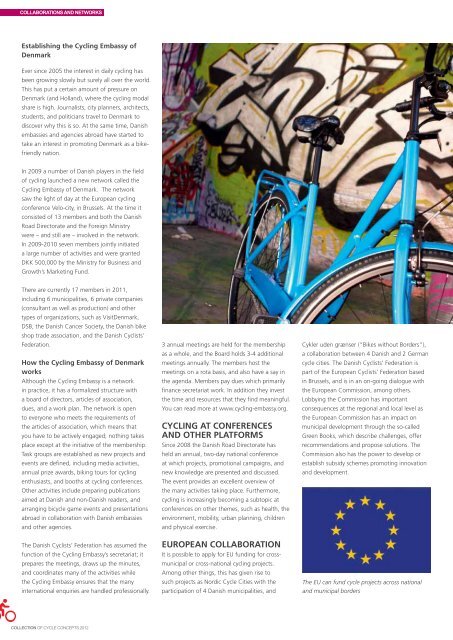Collection of Cycle Concepts 2012.pdf - Fietsberaad
Collection of Cycle Concepts 2012.pdf - Fietsberaad
Collection of Cycle Concepts 2012.pdf - Fietsberaad
You also want an ePaper? Increase the reach of your titles
YUMPU automatically turns print PDFs into web optimized ePapers that Google loves.
COLLABORATIONS AND NETWORKS<br />
Establishing the Cycling Embassy <strong>of</strong><br />
Denmark<br />
Ever since 2005 the interest in daily cycling has<br />
been growing slowly but surely all over the world.<br />
This has put a certain amount <strong>of</strong> pressure on<br />
Denmark (and Holland), where the cycling modal<br />
share is high. Journalists, city planners, architects,<br />
students, and politicians travel to Denmark to<br />
discover why this is so. At the same time, Danish<br />
embassies and agencies abroad have started to<br />
take an interest in promoting Denmark as a bikefriendly<br />
nation.<br />
In 2009 a number <strong>of</strong> Danish players in the field<br />
<strong>of</strong> cycling launched a new network called the<br />
Cycling Embassy <strong>of</strong> Denmark. The network<br />
saw the light <strong>of</strong> day at the European cycling<br />
conference Velo-city, in Brussels. At the time it<br />
consisted <strong>of</strong> 13 members and both the Danish<br />
Road Directorate and the Foreign Ministry<br />
were – and still are – involved in the network.<br />
In 2009-2010 seven members jointly initiated<br />
a large number <strong>of</strong> activities and were granted<br />
DKK 500,000 by the Ministry for Business and<br />
Growth’s Marketing Fund.<br />
There are currently 17 members in 2011,<br />
including 6 municipalities, 6 private companies<br />
(consultant as well as production) and other<br />
types <strong>of</strong> organizations, such as VisitDenmark,<br />
DSB, the Danish Cancer Society, the Danish bike<br />
shop trade association, and the Danish Cyclists’<br />
Federation.<br />
How the Cycling Embassy <strong>of</strong> Denmark<br />
works<br />
Although the Cycling Embassy is a network<br />
in practice, it has a formalized structure with<br />
a board <strong>of</strong> directors, articles <strong>of</strong> association,<br />
dues, and a work plan. The network is open<br />
to everyone who meets the requirements <strong>of</strong><br />
the articles <strong>of</strong> association, which means that<br />
you have to be actively engaged; nothing takes<br />
place except at the initiative <strong>of</strong> the membership.<br />
Task groups are established as new projects and<br />
events are defined, including media activities,<br />
annual prize awards, biking tours for cycling<br />
enthusiasts, and booths at cycling conferences.<br />
Other activities include preparing publications<br />
aimed at Danish and non-Danish readers, and<br />
arranging bicycle game events and presentations<br />
abroad in collaboration with Danish embassies<br />
and other agencies.<br />
The Danish Cyclists’ Federation has assumed the<br />
function <strong>of</strong> the Cycling Embassy’s secretariat; it<br />
prepares the meetings, draws up the minutes,<br />
and coordinates many <strong>of</strong> the activities while<br />
the Cycling Embassy ensures that the many<br />
international enquiries are handled pr<strong>of</strong>essionally.<br />
3 annual meetings are held for the membership<br />
as a whole, and the Board holds 3-4 additional<br />
meetings annually. The members host the<br />
meetings on a rota basis, and also have a say in<br />
the agenda. Members pay dues which primarily<br />
finance secretariat work. In addition they invest<br />
the time and resources that they find meaningful.<br />
You can read more at www.cycling-embassy.org.<br />
CYCLING AT CONFERENCES<br />
AND OTHER PLATFORMS<br />
Since 2008 the Danish Road Directorate has<br />
held an annual, two-day national conference<br />
at which projects, promotional campaigns, and<br />
new knowledge are presented and discussed.<br />
The event provides an excellent overview <strong>of</strong><br />
the many activities taking place. Furthermore,<br />
cycling is increasingly becoming a subtopic at<br />
conferences on other themes, such as health, the<br />
environment, mobility, urban planning, children<br />
and physical exercise.<br />
EUROPEAN COLLABORATION<br />
It is possible to apply for EU funding for crossmunicipal<br />
or cross-national cycling projects.<br />
Among other things, this has given rise to<br />
such projects as Nordic <strong>Cycle</strong> Cities with the<br />
participation <strong>of</strong> 4 Danish municipalities, and<br />
Cykler uden grænser (“Bikes without Borders”),<br />
a collaboration between 4 Danish and 2 German<br />
cycle cities. The Danish Cyclists’ Federation is<br />
part <strong>of</strong> the European Cyclists’ Federation based<br />
in Brussels, and is in an on-going dialogue with<br />
the European Commission, among others.<br />
Lobbying the Commission has important<br />
consequences at the regional and local level as<br />
the European Commission has an impact on<br />
municipal development through the so-called<br />
Green Books, which describe challenges, <strong>of</strong>fer<br />
recommendations and propose solutions. The<br />
Commission also has the power to develop or<br />
establish subsidy schemes promoting innovation<br />
and development.<br />
The EU can fund cycle projects across national<br />
and municipal borders



